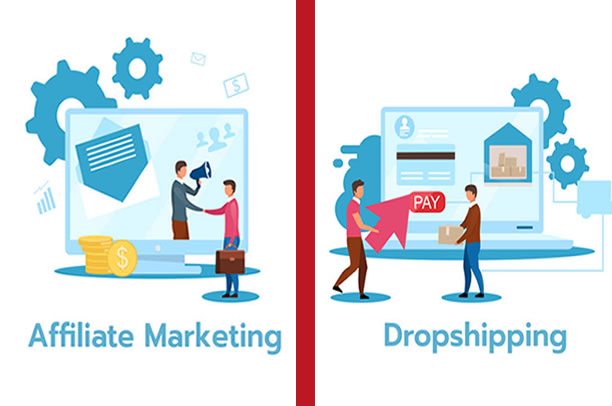Affiliate Marketing vs. Dropshipping

In the ever-evolving world of online entrepreneurship, two popular business models have gained significant traction over the years: affiliate marketing and dropshipping. These models offer aspiring business owners and marketers unique ways to generate income, but they come with their own sets of advantages and disadvantages. In this comprehensive guide, we’ll explore the pros and cons of affiliate marketing and dropshipping, helping you make an informed decision about which path to pursue.
Affiliate Marketing: The Power of Promotion
Affiliate marketing is a performance-based marketing strategy where individuals or affiliates promote the products or services of other companies in exchange for a commission on each sale. This section will delve into the merits and drawbacks of this model.
Pros of Affiliate Marketing
Affiliate marketing has been a cornerstone of online entrepreneurship for years, and for good reason. Here’s why:
1. Low Startup Costs and Minimal Risk
One of the most enticing aspects of affiliate marketing is its low barrier to entry. You don’t need to create a product or manage inventory, and there are minimal upfront costs. This makes it an attractive option for newcomers to the online business world.
2. Passive Income Potential
Once your affiliate links are set up and generating traffic, they can become a source of passive income. You can earn commissions while you sleep, allowing you to focus on scaling your business.
3. Wide Range of Products and Niches
Affiliate marketers have the flexibility to promote a vast array of products across various niches. This diversity enables you to find products that resonate with your audience, increasing your chances of success.
4. No Customer Support or Inventory Management
You’re not responsible for customer service or inventory management, saving you time and headaches. This allows you to concentrate on marketing and driving traffic to your affiliate links.
Cons of Affiliate Marketing
However, affiliate marketing is not without its challenges. Here are some of the downsides to consider:
1. Commission Limits
Affiliate programs often have set commission rates, limiting your income potential. High-ticket products can offer substantial commissions, but these are less common.
2. Dependency on Affiliate Programs
Your success as an affiliate marketer is closely tied to the affiliate programs you join. If a program changes its terms or shuts down, it can significantly impact your revenue.
3. Intense Competition
The low entry barrier also means fierce competition. Finding a unique angle or niche can be challenging, as many other marketers may be promoting the same products.
Dropshipping: E-Commerce with a Twist
Dropshipping is an e-commerce business model where entrepreneurs sell products without holding any inventory. Instead, products are shipped directly from the supplier to the customer. Let’s explore the pros and cons of dropshipping.
Pros of Dropshipping
Dropshipping has gained immense popularity due to its own set of advantages:
1. Minimal Startup Capital
Similar to affiliate marketing, dropshipping requires little capital investment. You can start an online store without the need to purchase products in advance.
2. Diverse Product Selection
With drop shipping, you can curate a wide range of products in your online store, allowing you to cater to various customer preferences and market trends.
3. Low Overhead Costs
Since you don’t hold inventory or manage a warehouse, your overhead costs are significantly reduced. This can lead to higher profit margins.
4. Scalability
Dropshipping is highly scalable. As your business grows, you can easily add new products or expand to different markets.
Cons of Dropshipping
While dropshipping offers many benefits, it comes with its own set of challenges.
1. Quality Control
You don’t have control over the quality and availability of the products you sell. Issues with product quality can lead to customer dissatisfaction and returns.
2. Lower Margins
Since you’re not purchasing products in bulk, your profit margins may be lower compared to traditional e-commerce models.
3. Inventory and Shipping Challenges
You’re reliant on your suppliers for inventory and shipping. Delays or stockouts can lead to customer frustration and lost sales.
A Deeper Dive: Analyzing the Key Differences
Now that we’ve explored the pros and cons of both affiliate marketing and dropshipping, let’s delve deeper into their key distinctions.
1. Ownership and Control
In affiliate marketing, you’re essentially a promoter. You have no ownership over the products or services you promote, and you can’t control product quality, pricing, or availability. In contrast, dropshipping allows you to have more control over the products you sell and the customer experience, but it also involves more responsibility.
2. Revenue Generation
Affiliate marketers earn commissions based on the sales they generate, while dropshippers make money by marking up the prices of products they sell. Affiliate marketing is more commission-driven, while drop shipping focuses on retail markups.
3. Customer Relationships
Affiliate marketers usually have less direct interaction with customers, as they’re essentially intermediaries between the customer and the product or service provider. Dropshippers, on the other hand, are responsible for customer service, which can be both a pro and a con, depending on your preference.
4. Risk Tolerance
Affiliate marketing generally involves lower risk due to the absence of inventory and customer support responsibilities. Dropshipping carries slightly higher risks related to inventory management, quality control, and customer satisfaction.
Making the Right Choice
Choosing between affiliate marketing and dropshipping depends on your individual goals, skills, and preferences. Here are some key factors to consider:
1. Skillset
If you’re a skilled marketer with a talent for driving traffic and conversions, affiliate marketing might be a natural fit. On the other hand, if you enjoy the e-commerce experience and have a flair for branding and customer service, drop shipping may be more appealing.
2. Investment
Consider your budget. If you have limited funds and want to minimize financial risk, both affiliate marketing and dropshipping are viable options. However, if you can invest more and manage inventory, you might lean toward dropshipping.
3. Long-Term Goals
Think about your long-term business objectives. If you’re aiming for passive income and a more hands-off approach, affiliate marketing aligns well with such goals. Conversely, if you aspire to build a brand and online store, drop-shipping provides the platform to do so.
4. Market Niche
Research your chosen niche. Some niches may be better suited for affiliate marketing, while others lend themselves better to dropshipping. Evaluate competition, affiliate programs, and suppliers within your niche.
Conclusion
The choice between affiliate marketing and dropshipping is not one-size-fits-all. Both business models offer unique opportunities and challenges, making them suitable for different entrepreneurs and scenarios. Ultimately, your decision should align with your skills, goals, and budget. Whichever path you choose, remember that success in the online business world often requires dedication, continuous learning, and adaptability.
Frequently Asked Questions
1. Can I do both affiliate marketing and dropshipping simultaneously?
Yes, it’s possible to combine both models. For instance, you can have an affiliate marketing website that promotes products related to your dropshipping niche. This diversifies your income streams.
2. Which model is better for beginners with no prior experience?
Affiliate marketing is generally considered more beginner-friendly due to its lower financial and time commitments. It’s a great way to learn the basics of online marketing.
3. How can I find affiliate programs or dropshipping suppliers?
To find affiliate programs, you can search for products or services you’d like to promote and look for affiliate programs on the respective websites. For dropshipping suppliers, platforms like AliExpress, SaleHoo, and Shopify can be excellent starting points.
4. Is it possible to transition from affiliate marketing to dropshipping or vice versa?
Yes, it’s possible to transition between these models. Your skills and experience from one model can be valuable when starting another. For example, if you’ve mastered affiliate marketing, you already have a strong foundation in online marketing for your dropshipping business.
In summary, whether you choose affiliate marketing or dropshipping, both models can be lucrative with the right approach. Your decision should align with your unique circumstances, goals, and preferences. Remember that success in either model depends on dedication, hard work, and continuous learning. Good luck on your entrepreneurial journey!



Leave a Reply
Want to join the discussion?Feel free to contribute!